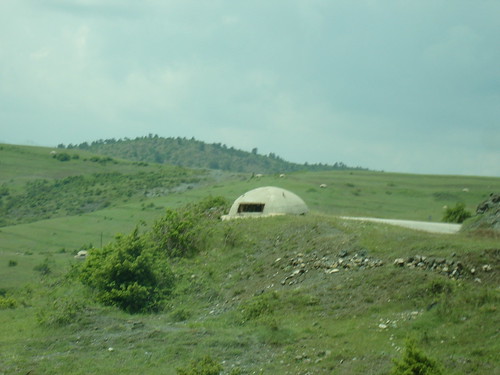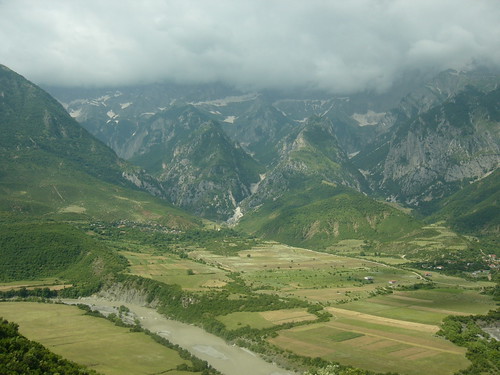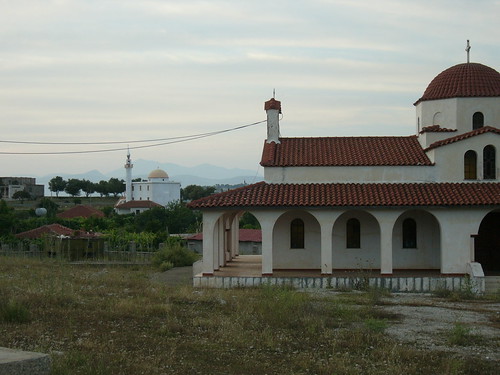Benjamin Franklin once said: “Certainty? In this world nothing is certain but death and taxes”. Well, I have another two certainty’s to add to the list: Japanese tourists are everywhere, and cab drivers are scum bags worldwide. But rather than complain, I want to tell you the stories I heard for this enigmatic country.
I have just spent three days (and two nights) visiting Albania. Whilst I was only there for a short time, I was satisfied in what I learnt, and absolutely fascinated. I stayed in Saranda, which is a port-city at the south of the country, near the Greek border. It is opposite the Greek island of Corfu. I stayed in an area called “exsamilia” which means ‘six miles’ – the six mile stretch of land under Saranda, which ends where Corfu starts. Deep rural territory! The south of the country is very Greek influenced, and I had to rely on my Greek for the entire time of my trip. Not only has Greek always been popular in the South, but some one-million plus Albanians (and that is a conservative estimate) have lived in Greece for some period of time. The people I stayed with, fled the country when the Iron curtain finally fell in 1990, and like so many others, recently returned to begin a new life.
Albania is one of the world’s most misunderstood countries – and I emphasis the mis-understanding of its people. Until 1990, it was a communist country run by the iron-fist of Hoxha (pronounced”Hodja”), as first-secretary (pronounced “dictator”). Access to the outside world was completely shut off, and Hoxha created a country that was so similar to George Orwell’s Nineteen Eighty-Four that it sent a shiver up my spine. His death in 1985, which is still being lamented, led to the country becoming the last domino to tumble in Eastern Europe’s communist downfall.
Under Hoxha’s rule, organised religion was banned. The entire population was spread out into small villages, with freedom of movement prohibited, even to the next town. Agriculture was collectivised. People were paid a daily wage of 200 Lekke, with no one in the country receiving more than 500. Young men served in the military, for I think three-years, and had to do nine-days annually again to retrain them with new weapons and methods. The country was turned literally into a military state, as there was a constant fear that Albania’s neighbours would invade. Cinema’s were available, but forget about love stories: the only movies shown were ones that where with the party line, namely being war. Television was first introduced in 1970, as an outlet for the governments propaganda. 
A tunnel Network connects the entire country, with small-domed bunkers dotting the country side for entry/exit into the tunnel networks. You would see these bunkers in the most remote, unpredictable areas.
If you criticised the regime, you were done for. If you forcefully pushed a woman in any sort of form, good-bye you. There was no crime, no criticism. Everyone lived like one big family. People felt safe; however they would wet their pants when I would ask about the Secret Police. It seems old habits die hard – such was the fear in the country.
Despite what people think, there was democracy. Polling booths opened at 6 and closed at 6.30. You could vote for anyone you wanted, as long as they were a legally recognised political party: which for all that time, was only the communist party. Election results for the communists always turned out to support it 99.98 per cent of the time. The other 0.02% were grandmothers who dropped their glasses. Although even if there were opposition candidates, I would not be surprised if, by their own free will, a majority would vote communist. They had been convinced to be happy with what they had.
As I said earlier, a daily wage consisted of 200 Leke. With 300 Lekke, you could buy 15 kg of bread, to give you an idea of the cost of living. To pay off your debt to the government for living in an apartment, you simply had to work one day a month. Theoretically people worked eight hours a day, starting at 7am, although most would doze off, clocking a few hours and spending the rest of the day chatting. They worked seven days a week. There were opportunities for entertainment, and there were no restrictions on procreation! But with such work hours, no one stayed out late. In fact, if you were seen out past 12am, you were in trouble. You would be criticised as being lazy and against the country, and you would be put in the prisons. To this day, no one knows what happened in those prisons.
When foreigners would come into the country, or Albanians studied abroad to help with a skill shortage, they had to get their story right before they came in. They were told to tell everyone that the outside world is a mess. There is no electricity, clean water, pure lawlessness. They were told to say Albania was one of the luckiest countries in the world. Given that Albanians had no contact with the outside world, is it any surprise Hoxha is treated like a god?
In 1990, the communists were ousted. The country basically turned into a barbaric society of lawlessness. In 1997, over 70 per cent of the population lost their savings in pyramid schemes, which resulted in nationwide uproar. Groups broke into the military barracks, and guns were stolen. There was open street warfare on the roads. People would shoot at someone, just for the sake of target practice. As such, in 1990 and 1997, you saw a large majority of the population spread to neighbouring countries. One guy I met left with his friends in the winter, and trekked through the mountains to get to Greece. It snows a lot in winter in Northern Greece. But they were desperate.
Having been to Greece several times since 1990, I grew up with the Greek racism. That they were cunning, thieves, and no-good people. I believed that to the day I got into Albania. Even though I don’t like to think of people as unequal, I just always had this perception that Albanians were scum. How wrong was I! And how wrong is racial tension in the rest of the Balkans, where Albanians are shunned. I have never in my life been treated with more respect and hospitality. Although I had a negative experience with a taxi driver when the bus dropped me off at the border, that was only because he over-charged me – but this was more a case of my inexperience as a first time traveller rather than him being a bad person.
Everywhere I went, people would shout me drinks. Even my taxi drivers! On my way out of the country, I had to catch a bus for Corca to Progradec. During that one hour or so, I sat next to a middle aged Albanian man. He did not speak English or Greek; I did not speak Albanian. So we had a conversation purely with sign language. He knew ten words in English which helped, however four of those consisted of “I don’t speak English”. Once we got off the bus, he insisted I go to his house for a coffee. There his son, who spoke English, could translate. They then told me, after ten minutes in the house, that they would drive me to the Macedonian border in the wife’s brother?¢‚Ǩ‚Ñ¢s taxi, free of charge!! I saved about 10 Euros, as well as the hassle of trying to find transport to the border. Who would do that in Sydney?
At no stage, did I ever feel unsafe, or disrespected. In fact, everyone took a genuine interest in looking after me. The people I stayed with literally treated me like their son. The people I met along the way, were extremely worried about the next stage of my journey without their help. They would go out of their way to help me. The only thing I was worried about, was trying to work out the right-fare for a cab fare, but I only had to worry about that once, at the beginning. The cost of living is incredibly cheap there – I was told I was ‘ripped off’ by this restaurant at Saranda: I paid the equivalent to five euros, and was absolutely stuffed!
A lot of the young hate communism. But the old, or rather people 35+, think of the old days with nostalgia. There are two reasons for this: poverty, and security.
For people born in the communist state, that knew of a country with complete security, harmony, and equality. When capitalism and democracy came in, they saw lawlessness and inequality. Young girls who previously could walk around the country in perfect security, have been poached for prostitution around the Balkans. People are living in extreme poverty, and are being forced to fend for themselves. We may find it absurd how people like them prefer communism and totalitarianism over capitalism and democracy, and yet we need to see it though their eyes: their experience in being ‘free’ has turned their country in an anarchy. What so free about not being able to feed and protect your family?

Albania has got the cleanest water I have ever swum in. It also has the most beautiful inland landscape I have ever seen. My bus trip took me along roads I didn’t think roads could go, along mountains. Imagine two mountain ranges, separated by a valley 100 metres wide. And in that valley, a stream and sometimes river would run, with the ground completely covered in farm land. Unfortunately, I wasn’t able to take great pictures because the bus was moving, and when I realised I should take a picture, we had already passed the best bits. It really was breathtaking.
I think Albania has got massive potential. Not just as a tourist destination however. During communism, religion was banned. Organised religion is one of the biggest set backs of modern society, because it was a form of control imposed by empires 2000 years ago. The traditions, hatred and history constrain us to this day. As an Orthodox Christian, if I was to marry a Catholic Christian, my family would despair. In Albania however, if you are a Muslim, and you find a person you are happy with who is Christian, you have the full blessings of everyone. Whilst spirituality is an important part of the human dimension, organised religion should not be separating us. Despite Albanian’s economic problems, and inexperience in democracy, I think they are an advanced society, whereby all citizens are genuinely equal. In fifty years time, we will be seeing them as a model.

The elections next month are on everyone?¢‚Ǩ‚Ñ¢s minds. Whoever wins, people are predicting that it will be a hung parliament. The feeling with people is that the centre-right New Democracy party needs to win, to give the country stop steps forward, rather than backwards, as the communist party is doing. These elections will be the crucial thing to see whether it take 5 or 50 years for Albania to get itself together.
I am currently in Ohrid in (the Former Yugoslav Republic of) Macedonia, the tourist Mecca of the country. It really is beautiful here, and I am still experiencing, so I better get off this computer and find some English speaking locals. And as they would say in Macedonian, “ayde ciao!”.
